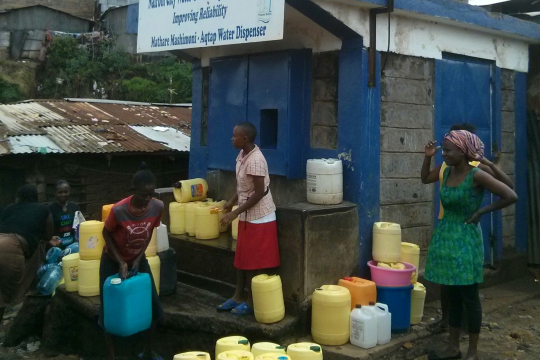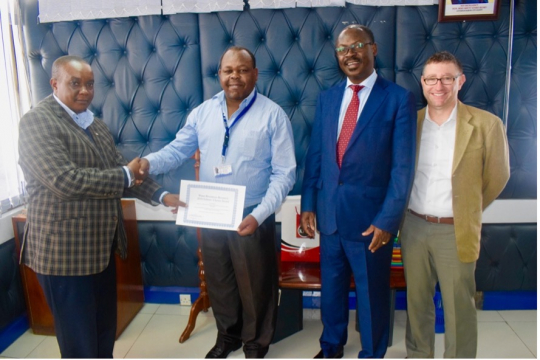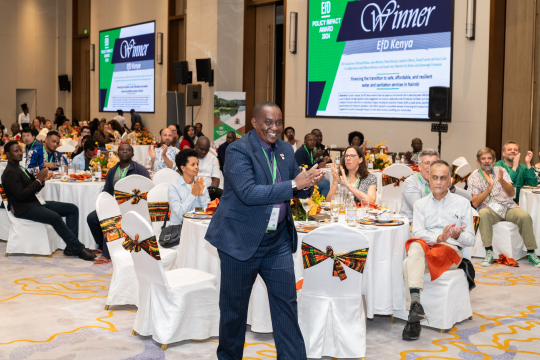A team consisting of EfD Kenya, international associates, and the Nairobi City Water and Sewer Company has, over the last decade, collaborated to solve challenges related to providing and funding affordable and resilient water and sanitation services in Nairobi. In addition, they have shared their knowledge with colleagues around the world. This unique team received the EfD Policy Impact Award 2024. And their collaboration continues to generate positive outcomes.
The team received the EfD Policy Impact Award for a suite of research projects, all supported by EfD and developed in close collaboration between the EfD researchers and the Nairobi City Water and Sewer Company (NCWSC).
“There are many benefits from our point of view,” says Mbutu Mwara, the planning, monitoring, and evaluation manager at NCWCS and one of the company's key partners.
“EfD provides us with evidence-based facts, which makes it easier to convince regulators and other stakeholders about our proposals. It also gives hands-on research experience to some staff in our company, and it helps us improve the efficiency of our operations,” he says.
The main advantage for the EfD researchers is to get first-hand information about issues the water company is struggling with. This allows them to fine-tune their research to be truly policy-relevant. They also get access to relevant data.
“This is one of our most important collaborations and has spanned over a long time. It's an excellent working relationship and has resulted in many impactful studies, says Richard Mulwa, Director at EfD Kenya.
“The collaboration has also connected us with other stakeholders in the water sector.”
Poor people could purchase more water
The collaboration started about a decade ago with a project on the subsidies in the water tariff system, the increasing block tariff (IBT), implemented in Nairobi, and how it affected low-income households. IBT is among the most widely used water tariffs, particularly in developing countries. This is partly due to the perception that the IBT is an effective way to target subsidies to low-income households.
“We found, however, that high-income residential and non-residential customers got a larger share of the subsidies. Poor people, who often don’t have access to piped water but purchase water at kiosks, were paying a higher price for their water,” explains David Fuente, EfD International Associate Researcher and part of the collaboration since the beginning.
This study, which was published in the prestigious science journal Water Resources Research and awarded the Editor's Choice, led to a change in how NCWSC priced water from public kiosks in low-income communities. Also, the demand for water at the water kiosks increased by over 50% after the new tariff was implemented, with implications for poverty reduction and health improvements.
Paved the way for further collaboration
“The initial project paved the way for further collaborative policy-relevant research. We found more issues with pricing and tariffs, consumer behavior, and customer bill payment that are essential for NCWSC and other utilities in the Global South trying to get on the path to financial sustainability,” says David Fuente.
There are more examples of how the EfD-supported research has guided policy decisions at NCWSC. For example, one collaborative study showed that a simple uniform volumetric price outperformed the commonly used Increasing Block Tariff (IBT) in all policy-relevant metrics that were considered in the study. Coincident with this study, NCWSC transitioned from a complicated five-block IBT to a simpler system.
Options to increase revenues
Some studies have suggested opportunities how to generate more revenues, which are needed to maintain the water infrastructure. The latest tariff implemented by NCWSC on April 1, 2023, for instance, introduced a pricing structure that improves the revenue generation from non-residential customers.
Similarly, a collaborative study on what customers regard as a fair price for water showed that customers who got information about the capital intensity of water service delivery were willing to pay a 30% higher price for water than those who didn’t get the information. This showed that active communication about the capital intensity of water and sanitation service delivery can build acceptance for price increases necessary to improve services.
After this project was completed, Nairobi Water increased its activities on social media, sharing stories related to service delivery, infrastructure repair, and the work Nairobi Water’s teams were doing in the field.
“We are now covering 100% of our operational costs and are also able to do minor investments,” says Mbutu Mwara.
Additional collaborative projects related to customer arrears and bill payment are currently ongoing. Preliminary results of a large-scale SMS experiment and a smaller-scale arrears forgiveness experiment are contributing to NCWSC’s ongoing efforts to improve customer bill payment.
Cross-country knowledge sharing
NCWSC is widely considered to be a high-performing utility in the East Africa region, and NCWSC hosts delegations from other countries for peer-learning exchanges. This provides opportunities for EfD Kenya’s partnership with NCWSC to have an even broader impact. For example, NCWSC recently hosted a delegation from Ethiopia to share best practices in utility management. They have also had delegations from as far as the Philippines and Latin America. Through such peer-to-peer learning, EfD’s partnership with NCWSC has the potential for policy impact at a much broader level.
“Other water companies are interested in, for instance, how we deal with the challenges in providing our services to informal settlements, our technical solutions, such as mobile-aided water meter reading systems, and our customer management systems,” relates Mbutu Mwara.
Pursuing academic studies
EfD-Kenya’s engagement with NCWSC has also had an impact related to capacity development. The two primary collaborators at NCWSC, Mbutu Mwaura and Josiah Gitu, Director of Commercial Services, are now pursuing their PhDs and have been actively engaged in the research process as co-authors. Mbutu Mwaura has become a Domestic Associate at EfD Kenya and has also written a successful EfD-supported grant to examine performance benchmarking in the water and sanitation sector in Kenya.
Received EfD Policy Impact Award
Richard Mulwa received the award at the EfD Annual Meeting in October 2024 on behalf of the whole team. It consists of him and Peter Kimuyu (EfD Kenya, University of Nairobi), Jane Mariara (PEP, University of Nairobi), David Fuente (University of South Carolina, EfD Kenya), Joe Cook (Washington State University, EfD Kenya), Jackson Otieno (Ministry of Devolution and Planning, EfD-Kenya), Mbutu Mwaura and (Josiah Gitu (Nairobi City Water and Sewerage Company)
“This was a watershed moment in our research and collaboration. The fact that our work was recognized among many and rewarded makes us very proud and elated. It gives us the impetus to continue the collaboration and produce more outputs and impacts,” comments Richard Mulwa.
By: Petra Hansson
Summary of research publications
Fuente, David, Josephine Gakii Gatua, Moses Ikiara, Jane Kabubo-Mariara, Mbutu Mwaura, and Dale Whittington. “Water and Sanitation Service Delivery, Pricing, and the Poor: An Empirical Estimate of Subsidy Incidence in Nairobi, Kenya.” Water Resources Research 52, no. 6 (June 1, 2016): 4845–62. https://doi.org/10.1002/2015WR018375
*Awarded Water Resources Research Editor’s Choice Award
*Profiled in Eos Strelich, L. (2016), Water subsidies may not be going to those who need them most, Eos, 97, https://doi.org/10.1029/2016EO056535.
Fuente, David. “The Design and Evaluation of Water Tariffs: A Systematic Review.” Utilities Policy 61 (December 1, 2019): 100975. https://doi.org/10.1016/j.jup.2019.100975.
Fuente, David, Jane Kabubo-Mariara, Peter Kimuyu, Mbutu Mwaura, and Dale Whittington. “Assessing the Performance of Water and Sanitation Tariffs: The Case of Nairobi, Kenya.” Water Resources Research 57, no. 9 (2021): e2019WR025791. https://doi.org/10.1029/2019WR025791.
Fuente, David, Richard Mulwa, and Joseph Cook. “Out of Sight Out of Mind: Household Perceptions of ‘Fair’ Water Prices in Nairobi, Kenya.” Water Resources Research 59, no. 3 (2023): e2022WR033374. https://doi.org/10.1029/2022WR033374.
Otieno, Jackson, Cook, Joseph and David Fuente. 2023. “The coping costs of dealing with unreliable water supply in the Nairobi commercial sector: An analysis of coping mechanisms for Kenya business”. EfD Discussion paper DP23-03.
M.T. Randriamaro, A. Espinola-Arredondo, D. Fuente and J. Cook. 2024. “A theoretical model of utility bill payment behavior”. EfD Discussion Paper DP24-01.


